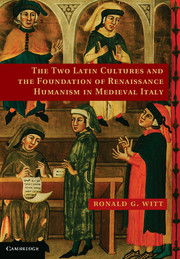Crossref Citations
This Book has been
cited by the following publications. This list is generated based on data provided by Crossref.
2012.
BOOKS RECEIVED.
Church History,
Vol. 81,
Issue. 3,
p.
756.
Andrews, Frances
2013.
Churchmen and Urban Government in Late Medieval Italy, c.1200–c.1450.
p.
1.
Andrews, Frances
2013.
Churchmen and Urban Government in Late Medieval Italy, c.1200–c.1450.
p.
45.
Wyatt, Michael
2014.
The Cambridge Companion to the Italian Renaissance.
Adelstein, Jennifer
and
Clegg, Stewart
2014.
And rewind! Recycling discourses of knowledge work and knowledge society.
Management & Organizational History,
Vol. 9,
Issue. 1,
p.
3.
Edelheit, Amos
2015.
Poliziano and Philosophy: The Birth of the Modern Notion of the Humanities?.
Traditio,
Vol. 70,
Issue. ,
p.
369.
Reinert, Sophus A.
2015.
A Companion to Intellectual History.
p.
402.
Pohl, Benjamin
and
Vanderputten, Steven
2016.
Fécamp, Cluny, and the Invention of Traditions in the Later Eleventh Century.
Journal of Medieval Monastic Studies,
Vol. 5,
Issue. ,
p.
1.
Hartmann, Florian
2016.
Brief und Kommunikation im Wandel.
p.
9.
Cormier, Raymond J.
2017.
The Legacy of Courtly Literature.
p.
79.
Stover, Justin A.
2017.
The Date of the Bucolic Poet Martius Valerius.
Journal of Roman Studies,
Vol. 107,
Issue. ,
p.
301.
Crisci, Francesco
2018.
"From Objects to Things" in the World of Aldus Manutius (1494-1515): Renaissance Publishing, and Institutional Dynamics in Markets.
MERCATI & COMPETITIVITÀ,
p.
131.
Gurashi, Dario
2018.
Encyclopedia of Renaissance Philosophy.
p.
1.
Sposato, Peter
2018.
Chivalry in Late Medieval Tuscany and Florence: Current historiography and new perspectives.
History Compass,
Vol. 16,
Issue. 7,
Kalm, Gustav
2018.
The Art of Law.
Vol. 66,
Issue. ,
p.
245.
Fredona, Robert
2019.
Encyclopedia of Renaissance Philosophy.
p.
1.
Vocino, Giorgia
and
West, Charles
2019.
"On the life and continence of judges": the production and transmission of imperial legislation in late Ottonian Italy.
Mélanges de l'École française de Rome. Moyen Âge,
Caravaggi, Lorenzo
2019.
A Knight and His Library:Romanitasand Chivalry in Early Thirteenth-Century Italy.
Viator,
Vol. 50,
Issue. 1,
p.
137.
Wilson, Anna
2020.
Petrarch’s Queer History.
Speculum,
Vol. 95,
Issue. 3,
p.
716.
Fredona, Robert
2020.
Encyclopedia of Renaissance Philosophy.
p.
1.





